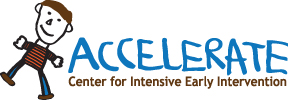All sessions are conducted by an occupational therapist and a speech- language pathologist.
Paul Graumann, MS CCC-SLP
Paul received his Master of Science Degree in Speech/Language Pathology from Moorhead State University. Paul has 20 years experience as a Speech/Language Pathologist working as a clinician with children with communication and behavioral disorders. His area of emphasis is with children who have autism and developmental delays. Paul has received extensive training in treating interactive communication disorders and associated behavioral issues related to decreased communication ability. Paul has worked as a Clinical Trainer responsible for providing education and training for staff working with children with communication and interaction delays and associated behaviors. He has experience working on autism evaluation teams and is trained in giving the Autism Diagnostic & Observation Schedule (ADOS). Paul additionally has extensive training and education in teaching social interactive skills and has completed courses in DIR Floortime and Pivotal Response Treatments.
Courtney Blake, OTR/L, ASDCS
Courtney received her Masters of Science in Occupational Therapy Degree from the University of South Dakota. She has attended a basic course in DIR Floortime and has taken coursework to become a Certified Autism Spectrum Disorder Clinical Specialist. She has experience working with visual rehabilitation and eye movement skills. Courtney has a thorough understanding of the principles of behavioral intervention from her studies through the University of South Dakota.
Occupational Therapy
From the American Occupational Therapy Association. Check out their website for more about the information found here.
Occupational therapy services focus on enhancing participation in and performance of activities of daily living (e.g., feeding, dressing), instrumental activities of daily living (e.g., community mobility, safety procedures), education, work, leisure, play, and social participation. Occupational therapy services are defined according to the individual’s needs and desired goals and priorities for participation. The occupational therapy intervention process is based on the results of evaluation and is individualized to foster occupational engagement and social participation through techniques and procedures directed at the client, activity, and environment. Occupational therapy uses a variety of intervention approaches to stimulate active engagement in activity.
Occupational therapists help with:
Providing strategies to facilitate the full participation of all children in daily routines.
Reducing environmental barriers that limit a child's participation in learning activities.
Planning developmentally appropriate instructional activities.
Planning and preparing preschoolers or individuals for the transition to kindergarten or other classroom environment.
Speech Therapy
The goal of speech therapy is to improve all aspects of communication. This includes: comprehension, expression, sound production, and social use of language. Speech therapy may include sign language and the use of picture symbols. At its best, a specific speech therapy program is tailored to the specific weaknesses and the environment of the individual child. The National Research Council describes four aspects of beneficial speech therapy.
Speech therapy should begin early in a child's life and be frequent.
Therapy should be rooted in practical experience in the child's life.
Therapy should encourage spontaneous communication.
Any communication skills learned during speech therapy should be generalizable to multiple situations. Thus, any speech therapy program should include practice in many different places with many different people. In order for speech therapy to be most successful, caregivers should practice speech exercises during normal daily routines in the home, school, and community.
Speech therapists can give specific examples of how best to incorporate speech therapy throughout a child's day. Social and play skills are also extremely important components of communication. Speech therapy is intended to improve these skills, and teach the ability to use communication skills appropriately.





